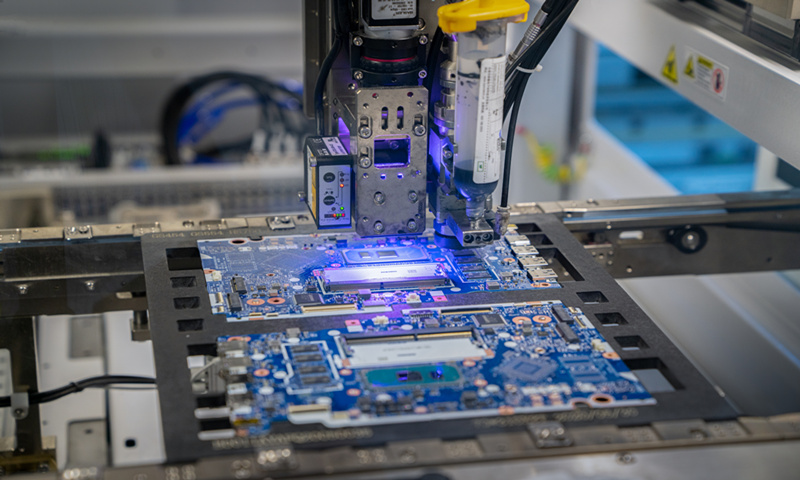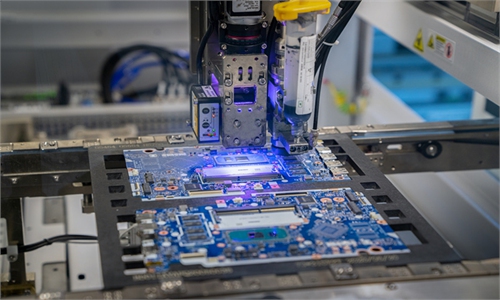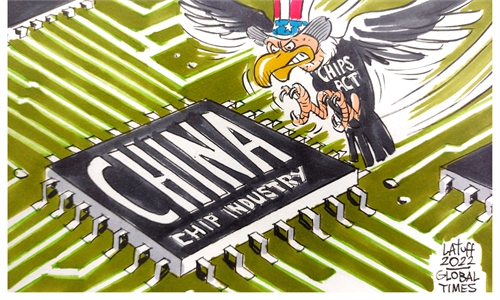Questioning anti-corruption campaign in China's chip industry is deliberately muddying the waters: Global Times editorial

A chip manufacture machine Photo: VCG
China's chip industry is in the midst of an anti-corruption storm that is attracting attention at home and abroad. With Ding Wenwu, general manager of the National Integrated Circuit Industry Investment Fund (Big Fund), under investigation for alleged serious violation of discipline and law, several top industry executives have been investigated in the past month. US public opinion has taken the opportunity to question the effectiveness of China's investment in the chip sector, claiming that it has "unnerved" the Chinese chip industry. This is a deliberate attempt to muddy the waters.
The first thing to point out is that a few corrupt officials cannot possibly represent the vast majority of the backbone of this industry who remain discreet and hard-working. In fact, China's industrial investment and financial policies over the years have worked well together, and the country has made outstanding progress especially in the past few years. That is the big picture of the chip industry. If it's true that China investment in this industry is "ineffective" as some US media outlets claimed, why does Washington feel so anxious about it?
Just one day before Ding was investigated, the US House of Representatives passed the CHIPS and Science Act by a clear margin. The $280 billion package, which has been in the works for three years, will be implemented after President Joe Biden signs it into law. At the same time Bloomberg also broke the news that Washington will expand restrictions on companies such as SMIC that can make anything more advanced than 14nm. In addition, the establishment of a "clean industrial chain" in East Asia that excludes China has also recently appeared in several US media analyses.
The RAND Corporation has summarized the US approach to suppressing China's technological progress as "tripping the competition," "running faster," and "putting the fix in," which includes both tech and public opinion war. In the past years, while China's chip industry struggled to break through the strangleholds from the US, some US and Western media never stop doomsaying about China. But it is these media that pay close attention to the development of China's chip industry: "19 of the world's 20 fastest-growing chip companies in the past four quarters were from Chinese mainland," and "China is moving forward with plans to build 31 new chip factories by 2024" with "the world's fastest expansion of chip capacity"… From these, we can see that be their pessimistic views or excessive flattery about China, they are the two sides of the same coin - the suppression of the development of China's chip industry.
Against this backdrop, China's chip industry will allow no bubble and "vermin" to exist. At present, the global chip industry is undergoing major changes. China is a latecomer but rising quickly, however, the basic situation of the industry being big but not strong has not changed. The alarm of external "strangleholds" is far from being lifted. It is bound to be a competition of time and endurance. The grim situation is the most sophisticated "X-ray machine", which puts every move of the industry and whether it is conducive to China's independent innovation under scrutiny.
The high-tech industry, including the chip industry, is a special field and needs to counter the capital cycle to a certain extent, especially it needs to prevent short-term speculation. Professionals in the chip industry not only need to have top-level professional knowledge, but also a strong sense of mission. This serious and powerful anti-corruption campaign highlights the country's serious attitude, and is also a wake-up call to the entire industry: there are difficulties and gaps, but fraud and corruption will by no means be allowed. On the path of independent innovation, there cannot be another "Hanxin" scandal. This is a clear signal sent by the anti-corruption campaign in the chip industry.
Data show that more than 55 percent of worldwide semiconductor industry R&D spending in 2021 was by American companies, while only 3.1 percent came from Chinese mainland companies. The funds we mobilize for semiconductors are clearly too little rather than too much. In this case, the best resources must be used where they are needed the most, and there must be no waste. The fact that few "vermin" were found does not deny the efforts of the "Big Fund" and of the entire industry. It is to lay a healthier foundation for the industry to have a fresh start after the cleansing.
The US is now hyping the so-called threat of China's chips so much. This is largely a response to the political division at home. Washington has not entirely given up looking down and showing arrogance toward China's scientific and technological innovation capabilities. Of course, this attitude, along with the constant growth of US suppression, should certainly boost our ambition to win the competition. At the same time, we must stay alert to prevent such enthusiasm from developing into eagerness for quick success and be wary of the forces within the system that seek to take advantage of the situation for personal gain.



